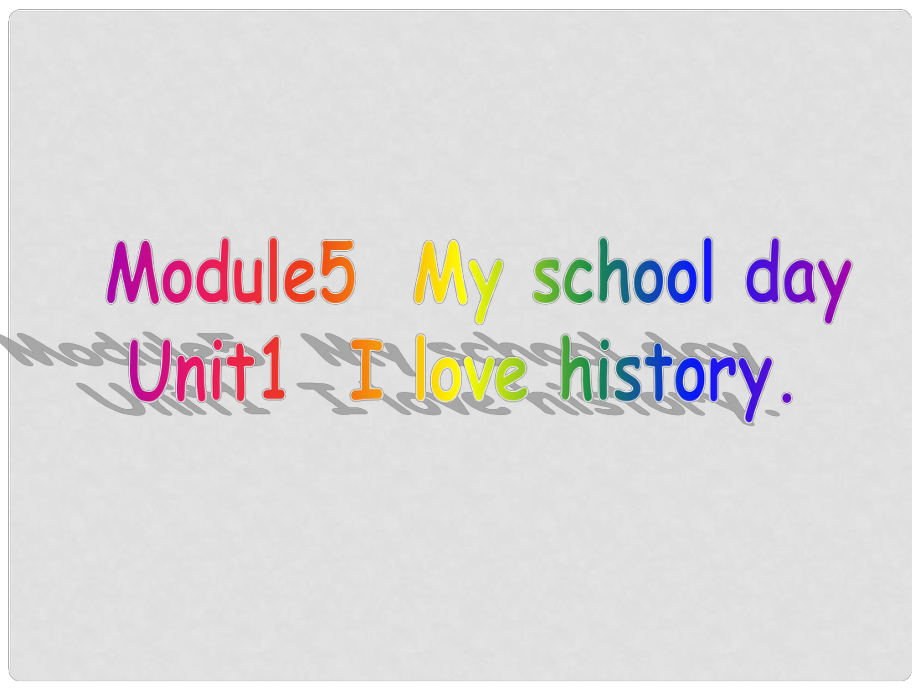《七年級英語上冊 Module 5 My school day Unit 1 I love history課件 (新版)外研版》由會員分享���,可在線閱讀�,更多相關(guān)《七年級英語上冊 Module 5 My school day Unit 1 I love history課件 (新版)外研版(23頁珍藏版)》請?jiān)谘b配圖網(wǎng)上搜索��。
1����、past過�;過�����;to差差Whats the time?Whats the time?Whats the time?Whats the time?1.When is your geography lesson?2.When is your English lesson?3.When is your Chinese class?We dont have geography lesson.We have English at .We have Chinese at ChineseartEnglishhistorymathsITP.EgeographyI like because its intere
2��、sting.I love and Im good at it.I dont like because its difficult.My favourite subject is CHECK ( ) THE TRUE SENTENCES. 1. Lessons begin at eight.2. They have four lessons in the morning.3. Maths is difficult for Betty.4. They have art on Monday.5. History is interesting for Betty.6. Tonys favourite
3�����、lesson is art.Lets read Activity 3 and check.TonyChineseComplete the passage with the correct form of the words from the box.because difficult favourite interesting lesson subject History is Bettys _ subject. She likes it ,_ its very _. Tonys favourite _ is Chinese. There are Chinese ,science, IT an
4、d maths _ on Monday morning, but for Tony, maths is_.favouritebecauseinterestingsubjectlessonsdifficultSpeaking Listen and repeat./u:/ afternoon /:/ talk/ good / because oclock what5WORK IN PAIRS. TALK ABOUT YOUR LESSONS. What time isWhen isartChineseEnglishhistorymathsscience?at eight oclock.at hal
5����、f past eleven.in the morning. in the afternoon.on Monday.I haveWe/They haveI dont haveWe/They dont haveI/They/We likeI/They/We dont likeRole play.( 角色扮演)角色扮演)A: Hi, what time/ when is your lesson?B: I have at (past/to)A: Do you like ? B: Yes, I do. / No, I dont.A: Why?B: Because its interesting/ dif
6、ficult/ Time TuesdayMorning7:50Chinese9:00maths9:55science10:55PEAfternoonAfternoon1:40English2:402:40History3:35ITTony和和Betty想了解我們���,他們將向你提問功課��、時(shí)間和喜好����。一想了解我們�,他們將向你提問功課、時(shí)間和喜好�����。一位同學(xué)扮演位同學(xué)扮演Tony���,向另一個(gè)同學(xué)提問。��,向另一個(gè)同學(xué)提問����。一�、寫出下列時(shí)間的表達(dá)法��。一���、寫出下列時(shí)間的表達(dá)法��。1. 7:00 _2. 9:30 _3. 6:20 _4. 11:10 _5. 5:55 _6. 3:45 _seven oclockh
7����、alf past ninesix twenty/twenty past sixeleven ten/ten past elevenfive fifty-five/five to sixthree forty-five/a quarter to fourExercise 二��、用相應(yīng)的介詞填空��。二��、用相應(yīng)的介詞填空�。1. I have dinner _ seven at home.2. Lucy can go to the factory _ her mother.3. Do you read English _ the morning?4. _ Friday they go to the par
8、k.5. I often have bread and milk _ breakfast.atwithinOnfor三�����、根據(jù)漢語提示完成句子。三���、根據(jù)漢語提示完成句子����。1. 今天上午玲玲和大明有一節(jié)數(shù)學(xué)課����。今天上午玲玲和大明有一節(jié)數(shù)學(xué)課。 Lingling and Daming _ _ _ _ this morning.2. 你的歷史課在什么時(shí)候����?你的歷史課在什么時(shí)候? _ _ your history _?3. 我們上午沒有英語�����。我們上午沒有英語��。 We _ _ English in the morning.have a mathslessonWhen islessondont have4.
9����、 今天是星期幾�����?今天是星期幾? 星期五���。星期五��。 _ _ is it today? Its _.5. 我們八點(diǎn)鐘上語文�����。我們八點(diǎn)鐘上語文���。 We have _ at _ _.6. 他們喜歡化學(xué)他們喜歡化學(xué), 但是不喜歡數(shù)學(xué)但是不喜歡數(shù)學(xué). They _ _, but they _ _ _.What dayFridayeight oclockChineselike chemistrylike mathsdontPractice根據(jù)要求完成句子。根據(jù)要求完成句子��。1. How about next Saturday?(改為同義句改為同義句)_ _ next Saturday?2. What abo
10����、ut _(go) swimming? (用所給單詞用所給單詞的適當(dāng)形式填空的適當(dāng)形式填空)goingWhat aboutWe have English at 9:50 on Monday.上英語課上英語課Say the sentences after the model.(仿照例子說句子)仿照例子說句子)1. maths 8:30 Tuesday We have maths at 8:30 on Tuesday.2. Chinese 9:00 Wednesday 3. history 10:30 Thursday 4. science 3:00 Friday afternoonWe have
11、Chinese at 9:00 on Wednesday.We have history at 10:30 on Thursday.We have science at 3:00 on Friday afternoon.1. I go to bed at 10:10 in the evening. 2. I do my homework at 7:30 in the evening. 3. I go to school at 8:00 in the morning. Try to tell the time in English.Exercise ten past tenhalf past s
12��、eveneight oclock4. Our lessons start at 8:30 in the morning. 5. We have our lunch at 11:20 in the morning.6. They play football at 4:00 in the afternoon. 7. We finish school at 4:50 in the afternoon. half past eighttwenty past elevenfour oclockten to five8. I have my dinner at 6:20 in the evening. 9. We have a break at 10:00 in the morning. 10. They go home at 5:30 in the afternoon.twenty past sixten oclockhalf past five
 七年級英語上冊 Module 5 My school day Unit 1 I love history課件 (新版)外研版
七年級英語上冊 Module 5 My school day Unit 1 I love history課件 (新版)外研版

